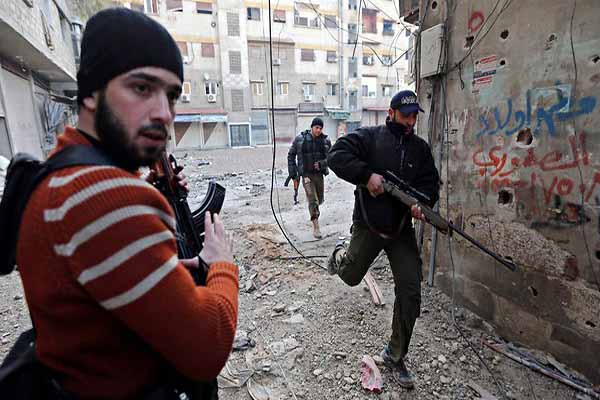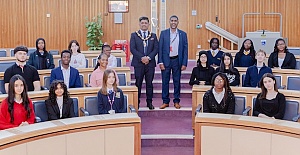Britain and France are experiencing a difference of opinion with another important UN power, Germany, regarding the embargo prohibiting weapons and military aid to the Syrian opposition. Highlighting the different approaches of two of the European Union's heavyweights, French Foreign Minister Laurent Fabius yesterday said on March 11 that lifting the arms embargo would help level the playing field in the two-year-old conflict in which 70,000 people have died. But his German counterpart, Guido Westerwelle, said after a meeting of EU foreign ministers in Brussels that such a move could lead to a proliferation of weapons in the region and spark a proxy war.
France reopened the sensitive issue only days after EU governments had agreed a hard-fought compromise on a limited easing of the arms embargo to help Assad's opponents.
"The question of lifting the arms embargo arises increasingly because there is a clear imbalance between Bashar al-Assad who is supplied by powerful weapons from Iran and Russia and the (opposition) National Coalition which doesn't have these weapons," Fabius said.
"I think this question of the embargo, which was already raised several weeks ago here, will have to be posed again very quickly because we cannot accept such an imbalance which ends in the massacre of an entire population," he told reporters.
The United States says it does not wish to send arms for fear they may find their way to Islamists.
Within the EU, Britain, supported by France, has been pushing for easing the arms embargo to help Syrian rebels. But many other EU states have reservations.
After weeks of wrangling, the EU amended the arms embargo last month to permit the supply of armoured vehicles, non-lethal military equipment and technical aid to the Syrian opposition, provided they were intended to protect civilians.
Britain moved quickly to expand the scope of the aid it gives the Syrian opposition, pledging to supply armoured vehicles and chemical weapons testing kits.
British Prime Minister David Cameron expressed Britain’ willingness to act unilaterally by stating, “We are still an independent country, we can have an independent foreign policy. If we felt action needed to be taken to help bring about change in Syria and felt our European partners were holding that back, we would have to change the approach.”
“If we cannot [agree on changes] we might have to do things our own way.”
Britain advocated lifting the embargo at a meeting of foreign ministers last month, but received only vague language confirming governments’ ability to provide “technical assistance” to the rebels.
William Hague, the foreign secretary, said last week Britain could start arming rebels within months, warning the conflict was becoming a ‘catastrophic’ humanitarian crisis.
Westerwelle and EU Foreign Policy Chief Catherine Ashton put the emphasis on helping rebuild rebel-held areas of Syria.
"I am convinced that it is necessary we do more for the reconstruction in the liberated zones," Westerwelle said.
"So the economic and financial embargo, which at the moment hits the whole country, should be handled in a more flexible way and maybe changed so that we can deliver goods for infrastructure, medical assistance, electricity, water," he said.
Ashton said the EU was looking at ways to work with the opposition to restore basic services, such as medical supplies, water purification, power generation and some administrative services.
Speaking at the Friends of Syria meeting in Rome, President of the National Coalition for Opposition Forces and the Syrian Revolution Moaz al-Khatib stated, “We request that, within the framework of the 7th article of the UN agreement, a safe aid corridor be opened to Syria, the Syrian people be supplied everything they need to defend themselves, the embargo on the Free Syrian Army be removed, and the regime no longer be supplied with arms under the pretext of old contracts.”
The UN is expected to renew its srms embargo to Syria in May.
FRANCE AND BRITAIN IN NEGOTIATIONS WITH RUSSIA
Speaking at the parliamentary foreign affairs committee, French Foreign Minister Laurent Fabius on Tuesday indicated that they are in negotiations with Russia, and that France, Russia and the United States are trying to draw up a list of Syrian officials with whom the opposition can negotiate, French Foreign Minister Laurent Fabius said on Tuesday.
"We worked together on an idea... of a list of Syrian officials who would be acceptable to Syria's opposition National Coalition," he told the foreign affairs committee of the National Assembly.
Fabius said Syria's opposition chief Ahmed Moaz al-Khatib had said in a "very brazen manner" that he was willing to negotiate with some regime officials but not President Bashar Assad.
Negotiations will be held in the British capital of London on March 13 between Russia and Britain under the 2+2 format. According to the format, the foreign and defense ministers of the two countries will come together. Russian
Foreign Minister Sergey Lavrov, made a statement on the eve of talks saying that he did not see a serious difference in opinions between the two countries in regards to the "the ultimate goal in Syria." He did however accept that there is disagreement between Moscow and London regarding tactics.
The topics of Afghanistan and Mali will likely be discussed between the two countries' defense ministers. According to experts, Sergey Shoygu and Philip Hammond, will also discuss issues related to the European missile shield.


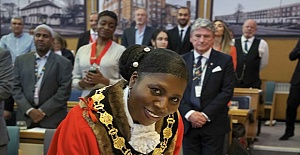 Margaret Greer has been sworn in as the new Mayor of Enfield
Margaret Greer has been sworn in as the new Mayor of Enfield Prime Minister Keir Starmer's 2025 Easter message
Prime Minister Keir Starmer's 2025 Easter message After Nesil Caliskan a by-election will be held in Jubilee ward in Enfield
After Nesil Caliskan a by-election will be held in Jubilee ward in Enfield Publishing the analysis, Labour’s Cllr Ergin Erbil said Everybody in Enfield deserves basic rights
Publishing the analysis, Labour’s Cllr Ergin Erbil said Everybody in Enfield deserves basic rights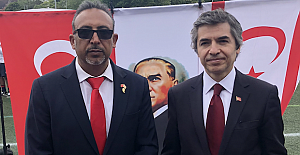 Great respect for Ataturk and enthusiastic youth celebration in England
Great respect for Ataturk and enthusiastic youth celebration in England UK AMBASSADOR TO TURKEY VISITS FETHIYE
UK AMBASSADOR TO TURKEY VISITS FETHIYE Journalists from Europe held the Turkish Media Workshop in Skopje
Journalists from Europe held the Turkish Media Workshop in Skopje The European Union called on Turkey to uphold democratic values
The European Union called on Turkey to uphold democratic values Fenerbahce is the EuroLeague champion
Fenerbahce is the EuroLeague champion Brennan Johnson’s first-half strike seals London side’s win
Brennan Johnson’s first-half strike seals London side’s win The 'Prince of Paris' has impressed in his first EuroLeague season
The 'Prince of Paris' has impressed in his first EuroLeague season Saran Media And Euroleague Basketball Extend Media Rights Partnership for Four More Years
Saran Media And Euroleague Basketball Extend Media Rights Partnership for Four More Years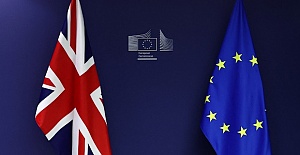 UK, EU reach landmark agreement on food, fishing ahead of London summit
UK, EU reach landmark agreement on food, fishing ahead of London summit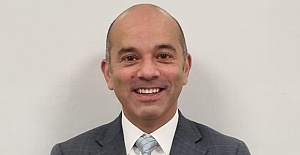 Perry Scott to become Enfield Council Chief Executive
Perry Scott to become Enfield Council Chief Executive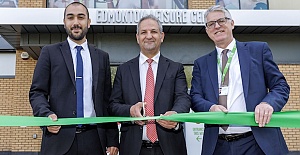 Residents welcomed back to Edmonton Leisure Centre
Residents welcomed back to Edmonton Leisure Centre Barclays has become the biggest UK lender so far to cut mortgage rates
Barclays has become the biggest UK lender so far to cut mortgage rates





